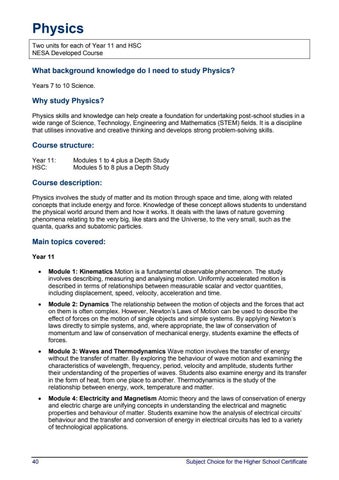Physics Two units for each of Year 11 and HSC NESA Developed Course
What background knowledge do I need to study Physics? Years 7 to 10 Science.
Why study Physics? Physics skills and knowledge can help create a foundation for undertaking post-school studies in a wide range of Science, Technology, Engineering and Mathematics (STEM) fields. It is a discipline that utilises innovative and creative thinking and develops strong problem-solving skills.
Course structure: Year 11: HSC:
Modules 1 to 4 plus a Depth Study Modules 5 to 8 plus a Depth Study
Course description: Physics involves the study of matter and its motion through space and time, along with related concepts that include energy and force. Knowledge of these concept allows students to understand the physical world around them and how it works. It deals with the laws of nature governing phenomena relating to the very big, like stars and the Universe, to the very small, such as the quanta, quarks and subatomic particles.
Main topics covered: Year 11 •
Module 1: Kinematics Motion is a fundamental observable phenomenon. The study involves describing, measuring and analysing motion. Uniformly accelerated motion is described in terms of relationships between measurable scalar and vector quantities, including displacement, speed, velocity, acceleration and time.
•
Module 2: Dynamics The relationship between the motion of objects and the forces that act on them is often complex. However, Newton’s Laws of Motion can be used to describe the effect of forces on the motion of single objects and simple systems. By applying Newton’s laws directly to simple systems, and, where appropriate, the law of conservation of momentum and law of conservation of mechanical energy, students examine the effects of forces.
•
Module 3: Waves and Thermodynamics Wave motion involves the transfer of energy without the transfer of matter. By exploring the behaviour of wave motion and examining the characteristics of wavelength, frequency, period, velocity and amplitude, students further their understanding of the properties of waves. Students also examine energy and its transfer in the form of heat, from one place to another. Thermodynamics is the study of the relationship between energy, work, temperature and matter.
•
Module 4: Electricity and Magnetism Atomic theory and the laws of conservation of energy and electric charge are unifying concepts in understanding the electrical and magnetic properties and behaviour of matter. Students examine how the analysis of electrical circuits’ behaviour and the transfer and conversion of energy in electrical circuits has led to a variety of technological applications.
40
Subject Choice for the Higher School Certificate




